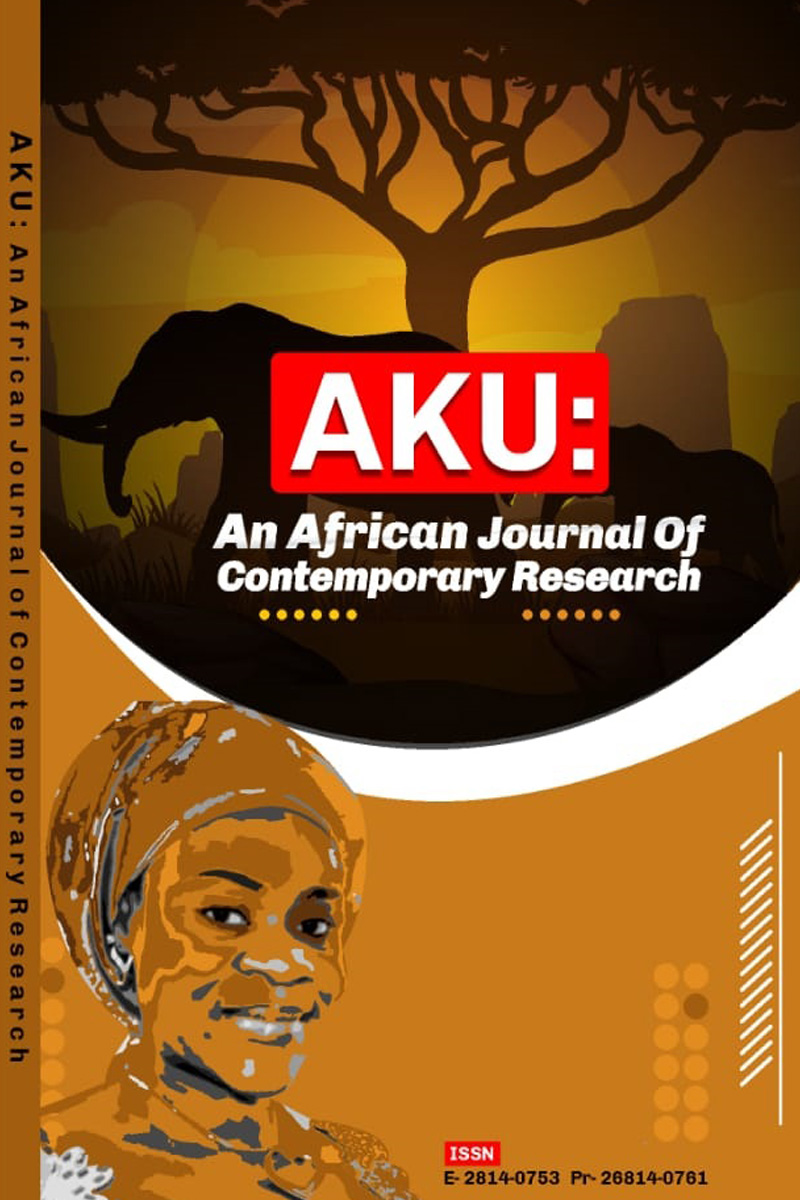 AKU - An African Journal of Contemporary Research (AAJCR) (Vol. 4 No. 3, 2023)
ENVIRONMENTAL POLLUTION AS A RESULT OF THE QUEST FOR ENERGY IN THE CONTEMPORARY NIGERIAN SOCIETY: AFRICAN TRADITIONAL RELIGION AS A REMEDY
AKU - An African Journal of Contemporary Research (AAJCR) (Vol. 4 No. 3, 2023)
ENVIRONMENTAL POLLUTION AS A RESULT OF THE QUEST FOR ENERGY IN THE CONTEMPORARY NIGERIAN SOCIETY: AFRICAN TRADITIONAL RELIGION AS A REMEDY
ABSTRACT
The paper examines environmental pollution as a result of the quest for energy in the contemporary Nigerian society. The paper observes that the problem was ushered into the world and by implication into Nigeria as a fallout of the misinterpretation of Genesis 1: 28 inherited from Judaism and found its way into Christian thought and eventually into the Western value system and thinking of viewing the universe as serving the needs and wants of mankind alone. This thinking of subduing the universe is the driving force behind all our technological and scientific breakthroughs, whereby man tries to conquer the world for his benefits and making the world a better place for living. As a result of these orientations, there is this crave for materialistic acquisitions that are insatiable in the mist of natural resources that are limited in nature which fuels the rising need for development, is a direct function of combination of the factors of production backed by the need and demand for the supply of adequate sources of energy through exploitation. The ever increasing and insatiable materialistic acquisitions mean a corresponding exploitation of the natural resources which becomes excessive leading to environmental pollution. The spiritual dimension of the world and of life was discarded so that the problem we are having today as regards environmental pollution is a crisis of values albeit a much deeper moral crisis. The human race no longer see themselves as part of an ontological arrangement in a cosmic web where man is only a constituent part and a steward of other constituents such as trees, mountains, rivers, other lesser animals and the like all under the perview of a Supernatural Being or an umoved Mover of the universe. This has informed the study. In tackling this problem, the paper used the secondary source of data collection and from the theoretical foundation of ontological balance inherent in the world that is taken seriously by the beliefs and practices imbued in African Traditional Religion. A case is been made here, that there are good beliefs and practices such as totems and taboos, deification of natural phenomena, a wholistic view of the interdependence of the spiritual and physical worlds and the like found in African Traditional Religion could be used as a remedy to this problem of environmental pollution as a result for the quest for energy. Some of the recommendations includes: there should be an energy policy in the country that take into cognisance the various good beliefs and practices of African Traditional Religion found in the different indigenous communities in the as a way of having a sustainable and work energy policy with minimal environmental pollution. In other words, there should be a bottom to top approach in the formulation of energy policy in the country with the incorporation of the good beliefs and practices of African Traditional Religion that guard against environmental pollution which is at an alarming state, the basic tenents of African Traditional Religion regarding the sustainability and conservation of the environment should be incorporated into the teaching curriculum of our educational system especially at the primary and secondary levels so as to target students that have impressionable minds to inculcate in them these tenents that they may grow up using energy resources of the environment that is pollution friendly, amongst others.

